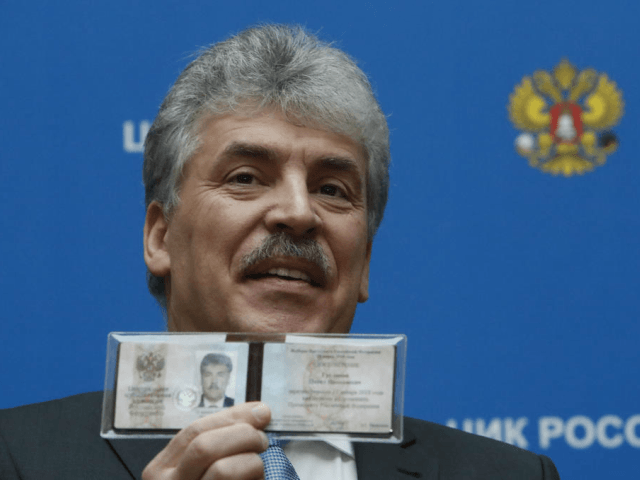The Russian Communist Party decided to shake up its moribund image by registering a surprise candidate to run against Vladimir Putin for president: a relatively young and wealthy businessman with a sense of humor named Pavel Grudinin.
Reuters describes Grudinin as “unorthodox” and not your “typical communist candidate” because he “makes jokes, is open about the fact that he earns 20 million rubles ($353,773.17) a year, says modern communists should learn from the USSR’s mistakes, and advocates Russia borrowing some aspects of Chinese-style communism.”
He is also more willing to criticize Putin for failing to keep his campaign promises and clinging to power for too long, recently comparing him to Leonid Brezhnev, who clung to power until his death in 1982 despite visibly poor health.
Putin goes out of his way to demonstrate that his health is robust, in the process launching many humorous Internet memes, although these days he seems more interested in cultivating a puppies-and-kittens image. (Literally.) Putin has held the presidency since 2000, with a four-year break beginning in 2008, which will get him into Brezhnev territory if he wins another term.
Putin is widely expected to win, and if he does not, it probably will not be Grudinin who upsets his victory. The Communist Party has about a quarter of the support it enjoyed at its peak, and it tends to be more popular with older Russians than young people, so shaking up its calcified leadership with a 57-year-old surprise candidate probably will not help all that much at the polls. In fact, Reuters postulates the net effect of Grudinin’s candidacy might be increasing Putin’s total haul of votes because the race will look slightly more interesting and more voters will turn out.
Grudinin has a background in agricultural management and has won a few “Manager of the Year” awards from the Russian agricultural industry. He currently holds about 43 percent of the stock in the Lenin State Farm near Moscow. He presents his agricultural projects as communities (one might even say “communes”) unto themselves, with free housing and health care for employees along with numerous other subsidized benefits.
His registration as the Communist Party candidate leapfrogs him ahead of 73-year-old party leader Gennady Zyuganov, who has been the communist candidate in almost every presidential election of the past two decades. Grudinin won an overwhelming majority of the votes at a secret ballot to select the party candidate last week, even though he is not a formal member of the Communist Party.
Grudinin unveiled a 20-point campaign platform on Thursday, ostensibly designed to “make Russia’s riches, its natural, industrial and financial resources serve its people” by “nationalizing strategically important and systemic industries, the power sector, railways, communications systems, and leading banks.”
He also called for keeping foreign investment capital out of Russian markets, pulling out of the World Trade Organization, devising a more steeply progressive tax system in which “taxes will grow for the rich and will be abolished for the poor,” raising the minimum wage, increasing retirement benefits, limiting the presidency to two four-year terms, and enhancing the combat readiness of Russian military forces.
Reporter David Filipov captures the Russian electoral environment with an anecdote from the rollout of Grudinin’s 20-point reform plan:
Communist Party nominee Pavel Grudinin was detailing his plans to raise living standards, invest in infrastructure and repatriate the huge sums held by Russians in offshore accounts, when the interviewer interrupted him: How could a Russian president find the time to focus on the economy, she asked, “when someone is trying to take Crimea from us and push us off the world stage?”
In other words, Putin sees Russia as a nation under siege by foreign adversaries and has largely convinced voters to adopt his paranoid worldview, so they are likely to keep him as president. With the usual caveats about the unreliability of public-opinion polls, especially in a media environment like Russia’s, Putin has lately been scoring record-high approval ratings. In a poll released on Thursday, Putin notched just under 58 percent public trust, compared to 3 percent for Grudinin.
Putin’s most persistent critic, Alexei Navalny, was banned from running in the election due to a conviction on corruption charges, which he plausibly claims were trumped up to thwart his presidential bid.

COMMENTS
Please let us know if you're having issues with commenting.